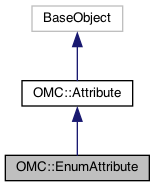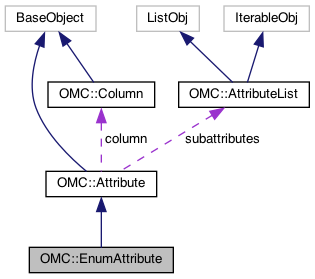
|

|
The enumerated attribute wrapper.
This object wraps an attribute that provides a value from a pulldown list containing a enumerated list of available options. This is a non-animateable attribute, and the value of the attribute must be an option from within the list of options that the attribute supports.
Show and Choose an Option from an EnumAttribute
Public Member Functions | |
| virtual OMC::EnumAttributeOption * | localvalue () const |
| Get the attribute's localvalue as a OMC::EnumAttributeOption value. More... | |
| virtual void | set_localvalue (OMC::EnumAttributeOption *value) |
| Sets the attribute's local value as a OMC::EnumAttributeOption value. More... | |
| virtual OMC::EnumAttributeOption * | value (int frame) const |
| Get the attribute's value at a given frame. More... | |
| virtual void | set_value (int frame=-1, OMC::EnumAttributeOption *value) |
| Set the attribute's value as a OMC::EnumAttributeOption at a given frame. More... | |
| OMC::Node * | node () const |
| The node that owns this attributes. More... | |
| virtual bool | unlink () |
| Unlinks a column from the attribute. More... | |
| virtual bool | link (const QVariant &column) |
| Links a column to the attribute, making it animate over time. More... | |
| bool | set_text_value (int atFrame, const QString &value) |
| Modify an attribute with a text value at a given frame. Change an attribute with a text value applied at a specific frame. This provides similar utility as the Javascript libraries available for the application. More... | |
| QString | get_text_value (int atFrame) const |
| Get a text value at a given frame. Retrieve the text value of an attribute at a specific frame. This provides similar utility as the Javascript libraries available for the application. More... | |
Public Attributes | |
| QList< OMC::EnumAttributeOption * > | options |
| Get the available options of the enum attribute. More... | |
| OMC::Column * | column |
| Get and set the column object attached to the the attribute, if it is supported. More... | |
| QString | column_name |
| Get and set the column name attached to the the attribute. More... | |
| QString | keyword |
| Get the keyword of the attribute. More... | |
| QString | display_name |
| Get the display name of the attribute. More... | |
| QString | type_name |
| Get the display name of the attribute. More... | |
| QString | full_keyword |
| Return the full keyword of the Attribute. More... | |
| bool | dynamic |
| Identifies if the attribute is dynamic. More... | |
| bool | linkable |
| Identifies if the attribute is linkable and can have a column linked to it. More... | |
| AttributeList * | subattributes |
| Get the list of subattributes belonging to the attribute. More... | |
|
inherited |
Get a text value at a given frame. Retrieve the text value of an attribute at a specific frame. This provides similar utility as the Javascript libraries available for the application.
| atFrame | - The frame at which to set the attribute. |
|
virtualinherited |
Links a column to the attribute, making it animate over time.
Links a column to the attribute, if the column is compatible with the attribute type. Also see setting OMC::Column::column with a Column object property.
|
virtual |
Get the attribute's localvalue as a OMC::EnumAttributeOption value.
Provides the localvalue as a OMC::EnumAttributeOption value. The local value is the non-animateable value of an attribute when no column is present. The Enum Attribute cannot be animated, and the localvalue and value at any frame should always be the same.
Retrieve a OMC::EnumAttributeOption Localvalue
|
inherited |
|
virtual |
Sets the attribute's local value as a OMC::EnumAttributeOption value.
Sets the local value of the attribute to the provided OMC::EnumAttributeOption value. The value can either be the EnumAttributeOption directly, its name or its value.
| value | - the OMC::EnumAttributeOption value to which the attribute should be set. |
Show and Choose an Option from an EnumAttribute
|
inherited |
Modify an attribute with a text value at a given frame. Change an attribute with a text value applied at a specific frame. This provides similar utility as the Javascript libraries available for the application.
| atFrame | - The frame at which to set the attribute. |
| value | - The new value of the attribute. |
|
virtual |
Set the attribute's value as a OMC::EnumAttributeOption at a given frame.
The OMC::EnumAttribute is not animateable, as such, this is equivalent to OMC::EnumAttribute::set_localvalue( value ). The method is available for consistency with other attribute types that can be animateable.
See set_localvalue( value ) for more information.
| frame | - this argument is ignored. |
| value | - the OMC::EnumAttributeOption to which the attribute will be set. |
|
virtualinherited |
Unlinks a column from the attribute.
Unlinks any column from the attribute.
Also see OMC::Column::column with property None.
|
virtual |
Get the attribute's value at a given frame.
The OMC::EnumAttribute is not animateable, as such, this is equivalent to OMC::EnumAttribute::localvalue(). The method is available for consistency with other attribute types that can be animateable.
See OMC::EnumAttribute::localValue for more information.
| frame | - this argument is ignored. |
|
inherited |
Get and set the column object attached to the the attribute, if it is supported.
Attributes that are animateable will support columns that provide values per frame. Different attribute-types support different column types. The OMC::Attribute::column provides access to getting and setting the Column object associated with this attribute.
Get the Column Associated with the Attribute:
Set the Column on the Attribute
|
readwriteinherited |
Get and set the column name attached to the the attribute.
A utility to allow references to the column by name, instead of by Column object (OMC::Column). This would be similar to the following:
|
readinherited |
Get the display name of the attribute.
Provides the display name of the attribute. The display name is read only, and is the name of the attribute provided within the GUI to the user.
|
readinherited |
Identifies if the attribute is dynamic.
Dynamic attributes are those that are created with scripted access to an attribute and are created dynamically and uniquely for that node. These dynamic attributes are not necessarily standard for the node-type, and can be added or removed from the node on-demand.
See OMC::AttributeList::create_dynamic_attr for more information.
Create a new Double Dynamic Attribute
|
readinherited |
Return the full keyword of the Attribute.
All columns can be referenced by their full keyword as this provides the full path to the given attribute on a Node.
Get the Keyword of All Attributes on a Node
|
readinherited |
Get the keyword of the attribute.
All columns are referenced by their keyword when relative to a given parent object. Otherwise, they are referenced by their full_keyword (OMC::Column::full_keyword) property – which contains the full path to that attribute on a given Node.
Get the Keyword of All Attributes on a Node
|
readinherited |
Identifies if the attribute is linkable and can have a column linked to it.
Only some attributes are animateable and accept a column. If a column is set on a non-linkable attribute, an error is thrown.
See OMC::Attribute::column for an example.
| OMC::EnumAttribute::options |
Get the available options of the enum attribute.
The Enum Attribute only supports its available options. The options property will provide all available OMC::EnumAttributeOption objects that this attribute will support.
Show Available Options
|
inherited |
Get the list of subattributes belonging to the attribute.
Provides the subattribute list (OMC::AttributeList) for this attribute, if one is available. Only certain attribute-types are considered complex, and contain subattributes.
Identify if an Attribute has Subattributes
See OMC::Attribute::column for more examples.
|
inherited |
Get the display name of the attribute.
Provides the type-name of the attribute. Different attribute-types provide different information to the node and also require different column-types when linked (if linkable).
See OMC::Attribute::column for an example.

